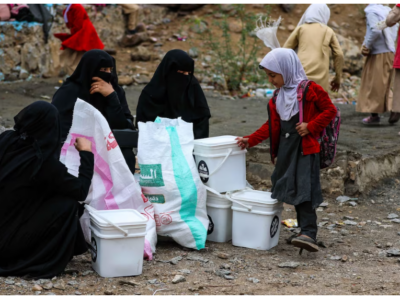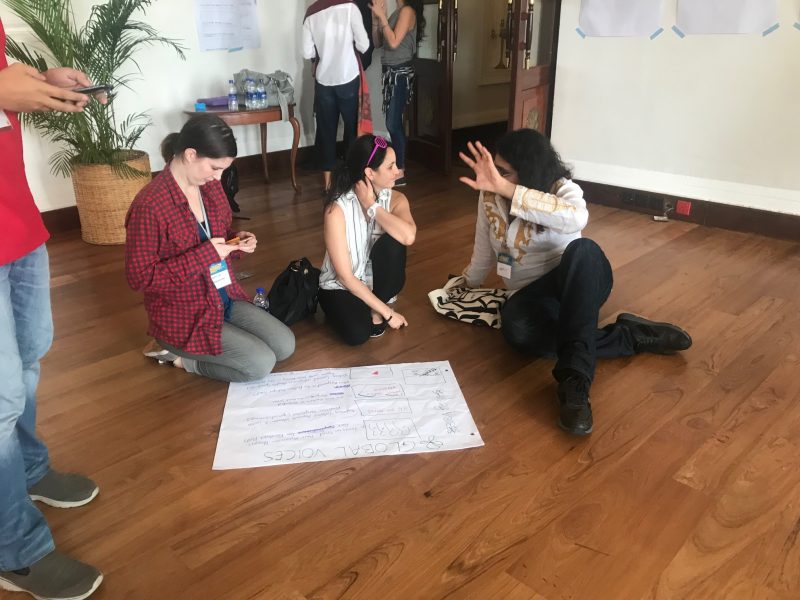
Jessica Anderson, Belen Febres-Cordero, and Arash Aziz reimagine the Global Voices homepage at the newsroom editors meeting at the Mount Lavinia Hotel, Colombo, Sri Lanka. Photo by Sahar Habib Ghazi. CC-BY-NC.
This post is part of series of reports on newsroom activities at the Global Voices Community Meeting in Colombo, Sri Lanka on Nov 28-Dec 1, 2017.
A day before the meetings with the full group of 130 community members started in Colombo, Global Voices newsroom editors and staff members got together for a day of reflections and brainstorming on our future.
In previous posts, we gave an overview of how we built the schedule for the newsroom staff meeting, our conversations on mission, on community and the stories we want to tell. This post is a follow-up to the last post on stories.
In the second half of the staff meeting, newsroom editors and project leads split up into groups of five to imagine their ideal homepage, populated with five examples of stories that they would like to tell and that fit of GV’s mission. The stories could be completely invented or based on a real-life situation and were supposed to represent a diversity of regions and themes.
Reimagining the Global Voices homepage
The brainstorms largely resulted in stories about free expression and other human rights, as well as stories of cross-border connection and grassroots efforts to change the status quo.
Here are the reimagined homepages we produced:
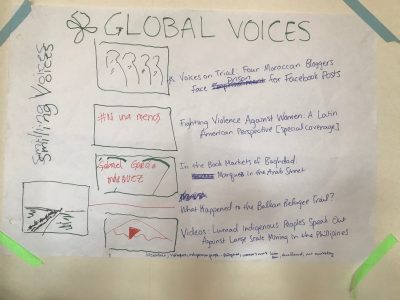
Homepage 1:
- Voices on trial: Four Moroccan bloggers face prison for Facebook post
- Fighting violence against women: A Latin American perspective (special coverage)
- In the book markets of Baghdad: Marquez in the Arab street
- What happened to the Balkan refugee trial?
- Videos: Luman indigenous peoples speak out against large-scale mining in the Philippine
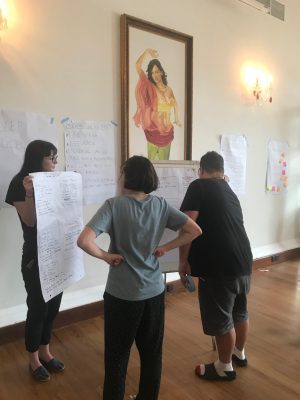
Homepage 2:
- Insight (Bridge renamed): This is what it's like to be a black policewoman in Spain
- In-depth: How the international left is threatening the resistance
- The Resistance: How Tunisia has also embraced graffiti to resist corruption
- Cross-regional: Why does Brazil translate more manga than anywhere else?
- Human interest: Nobody knows why this Russian singer became a meme in Brazil
Group 2 called themselves “The Dissatisfied” and they wanted to see more:
-interviews (have resources to tell human stories, telling stories in their own terms)
-stories about resistance
-analysis/essays (more Bridge; regional editors should be able to edit Bridge stories instead of it being centralized)
-cross-regional/collaborative stories
-human interest/cultural stories/cat stories/fun stories
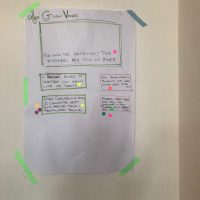 Homepage 3:
Homepage 3:
- Beyond the headlines: The Mugabes are still in power
- In Guatemala, access to WhatsApp can mean life or death
- After Charlottesville attack, US communities adopt South African truth and reconciliation practices
- Why Bangladesh is blocking just one Indian news site
- Facebook users speak more than 1,500 languages — but Facebook only speaks 40
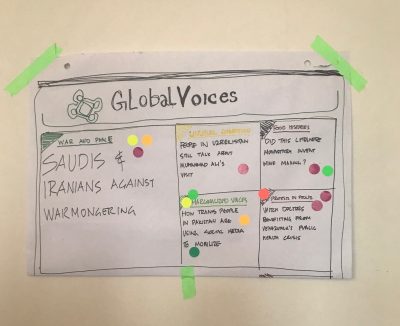
Homepage 4:
- War and peace: Saudis and Iranians against warmongering
- Unusual connection: People in Uzbekistan still talk about Muhammad Ali's visit
- Food histories: Did this Lebanese monastery invent winemaking
- Marginalized voices: How trans people in Pakistan are using social media to mobilize
- Protest in focus: Witch doctors benefitting from Venezuela's public health crisis
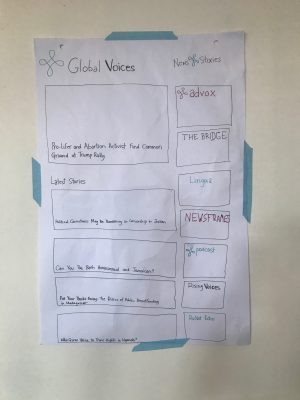
Homepage 5:
- Pro-lifer and abortion activist find common ground at Trump rally
- Political correctness may be bordering on censorship in Jordan
- Can you be both homosexual and Jamaican?
- Put your boobs away: The politics of public breastfeeding in Madagascar
- Who gives voice to trans rights in Uganda?
Here are the previous posts in this series:

